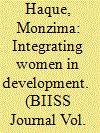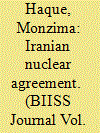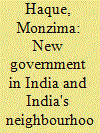| Srl | Item |
| 1 |
ID:
140303


|
|
|
|
|
| Summary/Abstract |
The global movement for the recognition of women’s rights as human rights attempted to identify those rights crucial to the well being of women. The Universal Declaration of Human Rights (1948) and other subsequent assertion of equal rights to men and women in spite of their sexual identity are very crucial in this regard. Conventional wisdom suggests that the progress towards equality for men and women has not been satisfactory in developing countries like Bangladesh where women are subject to exclusion as a result of the ‘socialeconomic-political’ as well as ideological privileges of men evident in the patriarchal structure of the society. The paper argues that although women’s presence and participation in the development process of Bangladesh have not been adequate, the initiatives at various levels to address this inadequacy and progressive movements of women in diverse sectors of Bangladesh have brought in a number of affirmative changes. With this aim, the paper attempts to review the current status of women in the political, economic and social development of the country and examines the strengths and limitations of integration of women in mainstream development structure.
|
|
|
|
|
|
|
|
|
|
|
|
|
|
|
|
| 2 |
ID:
143832


|
|
|
|
|
| Summary/Abstract |
Over the last two and a half years, negotiators from P5+1 and Iran are trying to reach out a diplomatic solution on the issue of nuclearisation of Iran. The motive behind such an arrangement had been to ensure that Iran’s nuclear ambition remains exclusively peaceful in harmony with the international non-proliferation principles. Iran too, wanted to break out from the shackles of sanctions that had limited its global commerce in the past years. With the conclusion of a nuclear agreement in Vienna, it is expected that Iran will not pursue actions to develop nuclear weapons, at least in the immediate future. Nevertheless, implementation of the agreement requires walking down an even more complicated path than negotiation and is considered to have significant implications for the Middle Eastern region. Given this context, this paper makes an attempt to review the nuclear deal being signed and looks into its future implications.
|
|
|
|
|
|
|
|
|
|
|
|
|
|
|
|
| 3 |
ID:
138559


|
|
|
|
|
| Summary/Abstract |
Maintaining harmony and peace in South Asia has been a crucial intent not only of India but also of its South Asian neighbours. Nevertheless, sustaining stable relationships among New Delhi and its South Asian neighbours have had remained a formidable challenge. Following May 2014 national election, a new government led by the Bharatiya Janata Party (BJP) assumed office in India. The new Prime Minister Narendra Modi, a Hindu nationalist, renowned for his impressive management of Gujarat’s economy as Chief Minister is now the leader of the one billion plus population. New developments, especially inviting all South Asian leaders in Indian Prime Minister’s oath-taking ceremony and choosing South Asian Himalayan countries for opening foreign visits, have stirred up euphoria regarding possibilities of re-energising the flagging discourse of South Asian neighbourhood. Building on these evolving scenarios, this paper looks into India’s South Asian neighbourhood discourse in the context of new government’s accession to power in India. Taking up the early days conducts of the new Prime Minister into consideration, the paper reveals that although the style of the new government to deal with neighbours may reflect changes, the overall objective management of India’s regional relations is unlikely to deviate much.
|
|
|
|
|
|
|
|
|
|
|
|
|
|
|
|